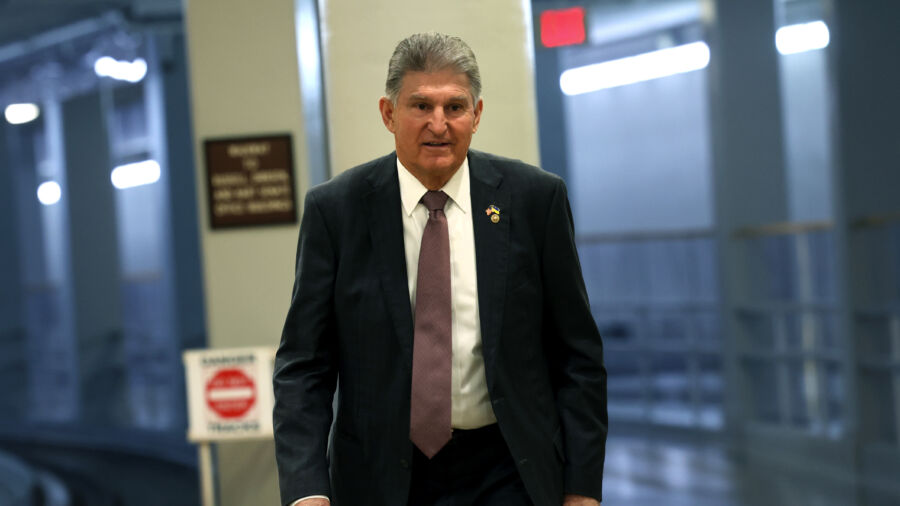Sen. Joe Manchin (D-W.Va.) said a new Biden administration ruling on electric vehicle tax credits provisions in the 2022 Inflation Reduction Act (IRA) was a significant deviation from what he believed was the intent of the law when he voted for it last summer.
A provision of the Inflation Reduction Act allowed for up to $7,500 in tax credits for electric vehicles that meet certain supply chain criteria. President Joe Biden’s administration supported the IRA and the legislation passed last year after Democratic lawmakers reached an agreement with the centrist Manchin over certain provisions of the bill, such as the supply chain requirements for electric vehicles. In December, however, Biden’s Treasury Department delayed implementation of the electric vehicle tax credit system until it could prepare guidance for how supply chain requirements would be enforced.
On Friday, the Treasury Department issued its guidance. Manchin issued a statement in response on Friday, criticizing the proposed guideline.
“The guidance released by the Department of the Treasury completely ignores the intent of the Inflation Reduction Act,” Manchin said. “It is horrific that the Administration continues to ignore the purpose of the law which is to bring manufacturing back to America and ensure we have reliable and secure supply chains. American tax dollars should not be used to support manufacturing jobs overseas.
“It is a pathetic excuse to spend more taxpayer dollars as quickly as possible and further cedes control to the Chinese Communist Party in the process. The guidance includes a 60-day comment period and I ask for every American to comment. My comment is simple: stop this now—just follow the law,” Manchin added.
The senator did not specify the portions of the Treasury Department ruling with which he disagreed.
NTD News reached out to Manchin’s office for further comment but did not receive a response before this article was published.
In the days leading up to the Treasury Department’s electric vehicle tax credit guidance, Manchin had threatened he could take legal action if the guidance deviated too far from what he agreed to under the Inflation Reduction Act.
Despite Manchin’s preemptive criticisms of the Treasury Department guidance, the Biden White House described its working relationship with Manchin as “respectful.” On Thursday, White House press secretary Karine Jean-Pierre said, “we’re going to continue to work with Senator Manchin on those shared priorities and values.”
It remains unclear whether Manchin and the Biden administration have communicated since the issuance of the electric vehicle tax credit guidance.
The White House also did not respond to an NTD News request for comment before this article was published.
Auto Trade Group Sees Limits on Tax Credits
While Manchin said the Treasury Department’s guidance misses the intent of the IRA to incentivize domestic electric vehicle production, some automakers believe the guidance will actually limit the tax credit eligibility of certain electric vehicle models.
“This latest turn will further reduce the number of eligible EVs,” said John Bozzella, the president and CEO of the Alliance for Automotive Innovation, an automakers trade association and lobbying group. “Fewer vehicles (and fewer customers) will qualify for the full $7,500 credit in the near term.”
Bozella indicated that he was uncertain as to how many electric vehicle models would actually qualify for the full $7,500 in tax credits, but said the guidance would only allow for a few of the 91 EV models currently for sale.
“Some EVs will certainly qualify for a partial credit,” Bozella said. “Given the constraints of the legislation, Treasury’s done as well as it could to produce rules that meet the statute and reflect the current market.”
Bozella predicted further constraints on EV tax credit eligibility as the Treasury Department begins to enforce a “foreign entity of concern” provision over the next two years. The Treasury Department guidance states that, beginning in 2024, “an eligible clean vehicle may not contain any battery components that are manufactured by a foreign entity of concern and beginning in 2025 an eligible clean vehicle may not contain any critical minerals that were extracted, processed, or recycled by a foreign entity of concern.” The “foreign entity of concern” provision is anticipated to specifically preclude Chinese firms from involvement in the electric vehicle supply chain.
“Even if the battery meets the thresholds I outlined above—any component (starting in 2024) and any critical mineral (starting in 2025) from China automatically disqualifies the vehicle from the credit,” Bozella wrote.

